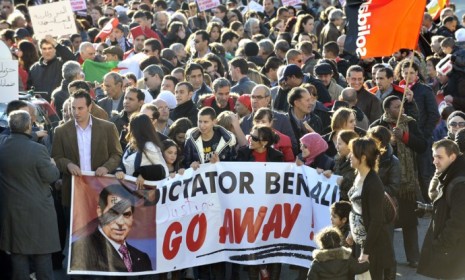Did Facebook fuel the Tunisia uprising?
Protesters used social networking to spread the word during the revolt that toppled Tunisia's authoritarian president. Could they have succeeded without Facebook?

A free daily email with the biggest news stories of the day – and the best features from TheWeek.com
You are now subscribed
Your newsletter sign-up was successful
The uprising that toppled Tunisia's iron-fisted leader, Zine El Abidine Ben Ali, has been hailed as a victory for social networking. As demonstrations broke out after a young Tunisian, Mohammed Bouazizi, set himself on fire to protest abuse at the hands of local authorities, Tunisian Facebook users posted information and videos showing every brutal arrest, making a connection between those who braved the streets and the rest of the nation. Did Facebook and Twitter merely help people keep track of the revolt, or were they what made the uprising possible? (Watch an al Jazeera report about social media in Tunisia)
Facebook overthrew Tunisia's government: It has been said that this youth revolt was "the world's first revolution without a leader," says Roger Cohen in The New York Times, but that's not quite true. Its leader was just "far away: Mark Zuckerberg, the founder of Facebook." Tunisia's experience proved that dictatorial regimes can "try to suppress Facebook. But it's empowering to the repressed, humiliated, and distant — and so a threat to the decayed Arab status quo."
The Week
Escape your echo chamber. Get the facts behind the news, plus analysis from multiple perspectives.

Sign up for The Week's Free Newsletters
From our morning news briefing to a weekly Good News Newsletter, get the best of The Week delivered directly to your inbox.
From our morning news briefing to a weekly Good News Newsletter, get the best of The Week delivered directly to your inbox.
The internet alone cannot make a revolution: "Europeans and Americans were quick to label the uprising a 'Twitter revolution,'" says Doyle McManus in the Los Angeles Times, but Tunisia's uprising was made possible not by the internet, but by widespread, pent-up anger at Ben Ali's "family-run kleptocracy" — feelings that extended to the military. That's why there's little chance the revolt will spread to Algeria and other Arab countries in North Africa. "It's nice to have Twitter, but it's even nicer to have the army on your side."
"Did tweeting topple Tunisia?"
Social media is a new tool for revolutionaries: "Clearly, the internet doesn't make the dissident," says Nancy Scola in The American Prospect. But activists everywhere — in Tunisia, and before that in Iran — are making use of the the web to coordinate and rally their supporters. "What's happening in Tunisia isn't a Twitter or a WikiLeaks revolution. It's just what revolution looks like these days."
"Why Tunisia is not a social-media revolution"
A free daily email with the biggest news stories of the day – and the best features from TheWeek.com
This is why the U.S. must promote internet freedom: "It took fed-up Tunisians gathering both online and offline in large numbers to force change," says L. Gordon Crovitz in The Wall Street Journal. So clearly social media deserves some of the credit. And that means Washington has to "get more serious" about championing internet openness around the world, so that social media's "liberating power is available for all to use."